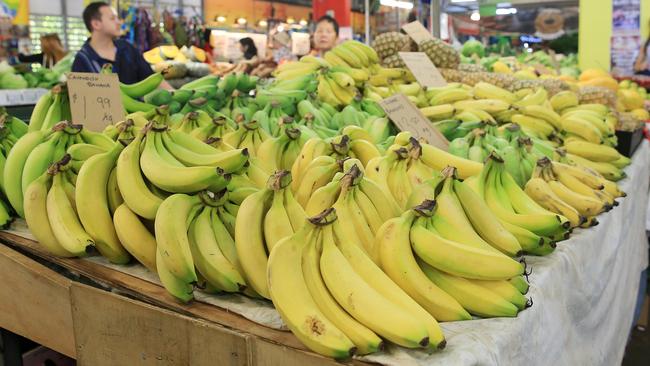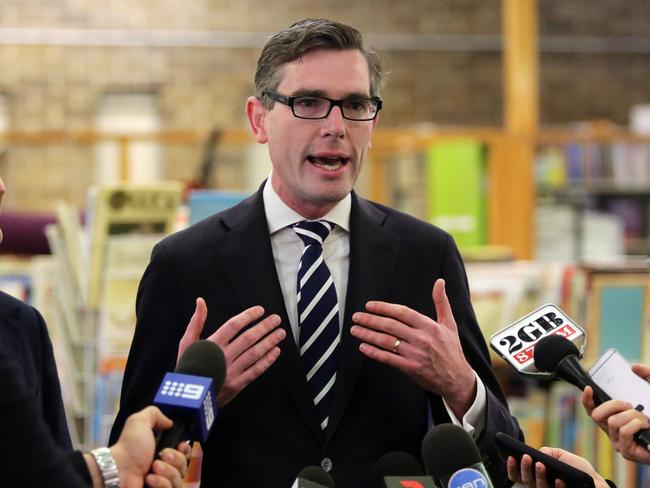Dominic Perrottet: GST’s banana-bender bailout leaves NSW footing the bill
HOW would you feel if a federal bureaucracy asked you to pull out your wallet and hand over $400 to the people of Queensland to pay their bills, asks Dominic Perrottet.

Opinion
Don't miss out on the headlines from Opinion. Followed categories will be added to My News.
HOW would you feel if a federal bureaucracy called up and asked you to pull out your wallet and hand over $400 to the people of Queensland, to foot the bill for the Queensland government’s services to its citizens?
Sounds unfair, right? After all, Queensland is the third most populous state in Australia, with abundant natural resources and huge tourism and economic opportunities. It should be able to stand on its own two feet.
Apparently not. Because by 2021, NSW taxpayers will be handing the Queensland government a $2 billion welfare cheque — an average of $400 for every working age NSW citizen.

And it’s all because of the broken way GST is distributed to Australia’s states and territories.
Seventeen years after it was first introduced, GST is now part of life in Australia.
Apart from some excluded goods and services, every time you buy something, ten per cent is collected by the Federal Government and goes into the national GST pool to be shared among the states and territories.
You might think all the GST paid by NSW taxpayers comes back to our state, or at least that each state gets an equal share per person.
You’d be wrong. Before the Federal budget each year, a body called the Commonwealth Grants Commission (or CGC) applies a complex formula to determine how much GST each state gets.
We don’t begrudge lending those states and territories a hand, to help them develop the services and infrastructure.
In simple terms, where a state has a lower than average ability to raise their own revenue from things like payroll tax, stamp duty or mining royalties, or where it costs a state more than the average to provide services to citizens, the CGC awards that state a bigger slice of the GST pie.
For example, a small, isolated state with limited resources - like Tasmania - has obvious limitations in terms of how much revenue it can raise. It will always struggle to establish an economy like those of Victoria, New South Wales or Queensland.
Similarly, the Northern Territory has a large remote population - many of them indigenous - and the services it has to provide cost more compared to the eastern seaboard economies.

We don’t begrudge lending those states and territories a hand, to help them develop the services and infrastructure they need to become more self-sufficient.
But it beggars belief that a state with as many natural and economic advantages as Queensland would get a handout from NSW taxpayers to the tune of $2 billion in just one year - funds that could be invested in better schools, better healthcare, or better transport right here.
Even if a state does get extra GST because, say, its costs of providing health services are higher than average, they aren’t required to actually spend the extra money on better health services.
They could spend it on exorbitant pay rises for bureaucrats and never be held accountable.
It’s madness. The system is broken.
Meanwhile here in NSW we have taken the hard but responsible decisions to repair our budget so we can now invest heavily in health, education and transport. Yet the efficiencies, economic growth and additional revenue opportunities those investments will bring will likely cost NSW taxpayers more of their share of GST down the track.
We are penalised, not rewarded, for making our state stronger and more independent, all while our citizens still foot the GST bill.
How is this fair?
The CGC is supposedly accountable to the Federal treasurer, but in reality no treasurer ever actually seems willing to step in to fix things, while the states themselves are powerless to intervene to fight for a fair share for their citizens. We are left at the mercy of the CGC’s impenetrable calculations.
It’s madness. The system is broken.
That’s why the NSW Government has called for big changes in our submission to the Productivity Commission’s review of GST distribution.
These reforms would give NSW an opportunity to hold lazy states to account.
We want each state’s distribution to directly correspond with the size of its population. That way every taxpayer gets treated equally, and the benefits of our productive reforms can actually be enjoyed by NSW citizens, rather than costing us more GST.
We are also calling for a new body made up of the state treasurers to oversee the GST carve-up, so the states who stand to win or lose actually have a say.
These reforms would give NSW an opportunity to hold lazy states to account when they come, cap in hand, asking for more of your GST year after year.
It’s time to fix this system so the hardworking people of NSW get their fair share.
Dominic Perrottet is the NSW Treasurer


